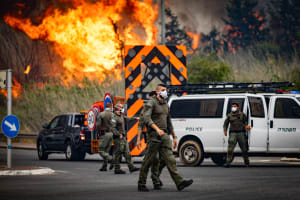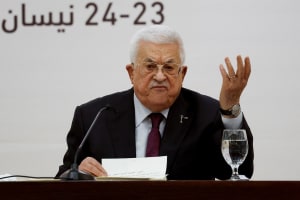WATCH: Unearthing truth: The Temple Mount Sifting Project's sacred mission
Journey to the heart of Jerusalem's sacred history with the Temple Mount Sifting Project. Hosted by Kayla Prague, this ALL ISRAEL Feature uncovers the remarkable story of how ancient artifacts from the holiest site in Judaism are being rescued and studied. Witness how archaeologists and volunteers from around the world are piecing together biblical history, one handful of soil at a time. From First Temple-era treasures to Herodian architecture, discover the fascinating finds that connect us to the spiritual legacy of the Temple Mount.
Click on the video above to watch or read the lightly-edited transcript below.
Shalom and welcome to this ALL ISRAEL Feature. I'm Kayla Sprague, and today we're here to explore a project of immense historic and spiritual significance – the Temple Mount Sifting Project. It's located here at the intersection between Mount Scopus and the Mount of Olives. And today you are going to hear from one of its co-founders.
This endeavor not only uncovers the treasures of the past, but it also strengthens the connection to the biblical history of Israel.
I can't wait to show you the Temple Mount, known in Hebrew as Har Habayit, the holiest site in Judaism, which holds profound significance for Christians, as well.
It's a cornerstone of the heritage of the Jewish people, and holds immense importance for Bible-believing believers all around the world.
This sacred ground is where King Solomon built the First Temple in the 10th century B.C.E., a place where the Ark of the Covenant was housed.
Later, the Second Temple was constructed and expanded by King Herod around 19 B.C.E.
This site is also revered by Christians for being the place where Jesus taught and overturned tables of the money changers.
Despite its profound importance, the Temple Mount has never been systematically excavated due to religious and political sensitivities.
However, in 1999, a significant event changed the course of history.
The Jerusalem Islamic Waqf, responsible for managing Islamic structures on the Temple Mount, conducted an unauthorized construction project. They removed approximately 9,000 tons of archaeologically rich soil without proper supervision, dumping it in the Kidron Valley.
Zachi Dvira is the founder and co-director of the Temple Mount Sifting Project.
Dvira: And they did it with heavy machinery, with no archaeological control; no archaeological supervision. They even penetrated structures from the Medieval period and destroyed them that existed over there.
They didn't reach the layers from the First and Second Temple period or Roman period. But this dirt contains a lot of artifacts from those periods from other sites that was dumped over there. But this was done in a barbaric way with bulldozers in a day and a half. So we lost the context.
Sprague: This act, although initially destructive, paved the way for a groundbreaking initiative, the Temple Mount Sifting Project, in 2004. Israeli archaeologist Gabriel Barkay and Zachi Dvira, who you'll hear from, with the support of their university and private donors, launched this project to recover and study the artifacts from displaced soil.
This project aims to rescue and analyze these treasures, providing invaluable insights into the history of the Temple Mount and by extension, the history of Jerusalem and the Jewish people. The work here is meticulous and painstaking volunteers, including the Evangelical community worldwide, sift through buckets of soil, uncovering fragments of pottery, glass vessels, metal objects, bones, and mosaic stones.
Dvira: This is the earliest artifact and this is very, very rare. This was found a few days ago. This is pottery from the Late Bronze period, from the Canaanite period. Maybe something like 0.3% of our pottery comes from the period that predates the First Temple period.
So you can see a reconstruction of what we managed to reconstruct from the Second Temple period. But here you can see another example of these flaws. This is probably the Second Temple period. This is made out of bitumen, a limestone that was quarried near the Dead Sea.
This is probably a jug or a jar from the First Temple period. We have a very high percentage of of jars in the Temple Mount. There were a lot of storages over there. It was a public place with lots of the treasuries of the temple and of the kingdom were in the Temple Mount.
Sprague: These artifacts span from the First Temple period to modern times, with some items dating back even further, like a pottery shard we saw today. Among the notable discoveries are ancient coins, jewelry, even fragments of the temple's decorated flooring titles. It's incredible.
But why is this work so important? First and foremost, it allows for the reclamation and preservation of biblical heritage here in the land. Each artifact tells a story connecting us to the ancestors of our faith and seeing their devotion to God.
Dvira: Since we have so much information, we could develop new methodologies – statistical methodologies – to study the dirt. So we even sampled dirt from other sites of Jerusalem to compare and contrast to see the distribution of the artifacts from the Temple Mount compared to the other sites in Jerusalem.
And we can see what kind of pot vessels were popular in the Temple Mount and what were unlike other sites in Jerusalem. It's a very big puzzle we're trying to assemble because we have to sort all this material and we have 120 categories of finds, half a million of artifacts that we have collected. And it's just a publication and analysis process.
Sprague: This project also serves as a powerful testament to the resilience and enduring faith of the Jewish people and Christians who hold this site dear. As it says in Psalms 102: "For your servants have cherished her stones, and they have redeemed her dust."
This verse, which was quoted to us today, encapsulates the spirit of the project: Redeeming the dust of the Temple Mount and cherishing its stones today.
Dvira: And this is literally what you did. You help us save the dirt of Mount Zion (Mount Zion is a biblical name of Har HaBayit) and reveal more of its heritage that was attempted to be destroyed, in the archaeological destruction that took place on Temple Mount. Will you help us save more of the heritage of the Temple Mount? The most important site in the heritage of Jerusalem. So thank you for helping us and taking part of it.
Sprague: The Temple Mount Sifting Project fosters a sense of unity and purpose among those who participate. Over 250,000 volunteers from around the world, including many Christians as well as local families and soldiers, have joined their hands in this sacred endeavor. Their contributions not only advance archaeological research, but they also strengthen the bonds between faith communities who share a commitment to preserving and understanding this holy site.
Dvira: The visitors do about 85% of the work. It's very tedious work. It requires lots of patience and we call it in Hebrew "ant work." This is an expression – ant work. And the only way we could do it is with the groups.
My philosophy in life is that a good experience doesn't come if the experience is a goal. The experience cannot be a goal. It's a result. And many, many people say this was a highlight of the trip to Jerusalem.
Kayla: Literally touching history.
Dvira: Yeah, they're touching history, but also saving saving history and helping this research.
Kayla: The Temple Mount Sifting Project is more than just an archaeological endeavor. It's a mission to honor and preserve the sacred history of the Temple Mount, recognizing that both in the spiritual realm and in earthly terms, the struggle over this place persists.
I'm Kayla Sprague, and I'm so thankful that you're with us today.

The All Israel News Staff is a team of journalists in Israel.














